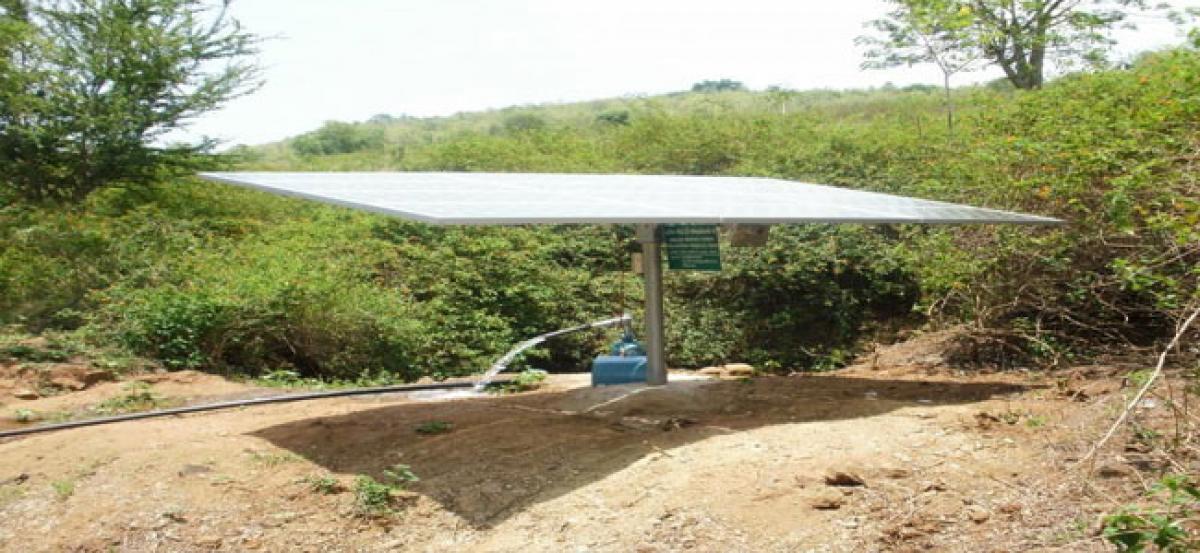Live
- G20 Leaders Will Talk About Climate, Taxes, and Trump's Return in Brazil
- COP29: CDRI announces $8 million funding for 12 projects to address climate crisis
- Anti-Telgu remarks: Actor Kasthuri Shankar moves court for bail
- Samsung AR Smart Glasses Set to Launch in 2025, Featuring Ray-Ban Meta-Like Design
- Kerala Industries Minister confident that new policy will boost plantation sector
- Madras HC plans inter-departmental monitoring committee to combat drug use in TN
- Bihar: Spotted deer dies due to heart attack in Banka district
- Mushtaq Ali T20: Shami to spearhead Bengal bowling attack, Gharami named captain
- Kharge's clarion call to oust Maharashtra's BJP-backed MahaYuti
- Why Ukraine’s Use of US Missiles Against Russia Could Lead to World War 3
Just In

SC, ST farmers in the district in several mandals are opting for solar pumpsets to get uninterrupted solar power for seven hours at a stretch for their horticulture and vegetable plantations, thanks to the Rural Development Trust (RDT) which is giving a big push to tapping solar energy.
Kothacheruvu (Anantapur): SC, ST farmers in the district in several mandals are opting for solar pumpsets to get uninterrupted solar power for seven hours at a stretch for their horticulture and vegetable plantations, thanks to the Rural Development Trust (RDT) which is giving a big push to tapping solar energy.
RDT is not only sinking a community borewell but also encouraging farmers of 4-5 in number to come together and share the water resources by implementing drip irrigation
If the farmers are unable to purchase pumpsets or sink borewells on their own, community farming and water sharing is being encouraged by farmers. RDT is not only sinking a community borewell but also encouraging farmers of 4-5 in number to come together and share the water resources by implementing drip irrigation.
The ground water position has changed from what it was in the 1980's to this day. When a bore was sunk up to 15-20 meters, abundant water used to spring up but now unless one digs to 400 meters, there are no traces of water in the
agriculture lands.
RDT is promoting horticulture plantation with a view to increase green cover in villages and raise it to the level of 33 percent in each geographical area.
Horticulture and solar pumpsets are going hand in hand in the selected mandals of Nallamada, Amadagur, Obuladevacheruvu, Kadiri, Kanakallu, Talupula, Mudigubba, Bukkapatnam, Kothacheruvu, Chennekothapalle, Gooty, Rayadurgam, Kanekal, Kuderu, Uravakonda, Penukonda, Amarapuram, Kalyandurg, Setturu and Kundurpi. About 530 solar pumpsets have been installed so far in the farmers’ fields.
Four farmers are benefited by one solar pumpset unit. Community farming has been a big success due to the RDT's dedicated efforts.
It is also promoting mango, guava, custard apple, sapota, black berries, coconut plantations and curry leaves apart from vegetable plantations as intercrop to enable them to sustain themselves during the horticulture crop gestation period.
As many as 3.64 lakh horticulture plantation were grown during 2016-17 financial year and an equal number is targeted this year in 2017-18. RDT Ecology Director Nageshwara Rao is giving a big push to integrated Solar and Horticulture Schemes. RDT is paying Rs 45,000 out of 55,000 beneficiary contribution that should be paid to NREDCAP.
For the BCs and OCs, RDT is sharing Rs 25,000 out of 55,000 beneficiary contribution. The beneficiaries have to pay Rs 30,000 as their share and they would get their solar pumpset.
RDT Ecology Centre Assistant Director Sathyanarayana told The Hans India that milch animals are also being given to each farmer's family as part of an integrated plan to provide economic boost to farmers and for producing organic manure.
Every day 8-10 litres of milk and income on vegetables come to the rescue of the farmers until they get handsome returns on their horticulture crops. Also, rain water harvesting structures including check dams, perculation tanks and restoration of old tanks forms part of rejuvenation of water resources.
By Ravi P Benjamin

© 2024 Hyderabad Media House Limited/The Hans India. All rights reserved. Powered by hocalwire.com







